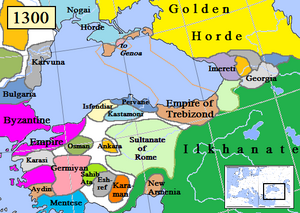Alexios II of Trebizond
Andronikos appealed to the Church to annul the marriage but the Patriarch refused to oblige, on the ground that the young man's wife was reported to be already pregnant.
Alexios' mother Eudokia, who now returned to Trebizond on the pretext of inducing her son to dissolve the marriage, advised him to keep his Iberian wife.
[4] In 1301 or 1302 he defeated a Turkoman invasion, who after conquering province of Chalybia, had penetrated deep into Trebizond's territory to sack Kerasous (modern Giresun), the second most important city of the Empire.
[5] Another problem were the Genoese, who had established virtual economic monopoly in the Black Sea area following the Treaty of Nymphaeum with Michael VIII Palaiologos in 1261.
[7] The Byzantinist Donald Nicol observed that Alexios, as well as his successors, "did better out of the foreigners than their colleagues in Constantinople, since the Italian merchants were not allowed to trade tax-free.
[10] The letter was sent by John XXII in 1329, but five months later; on May 3, 1330, the Emperor died of bubonic plague,[11] after a reign of 33 years and the throne passed to his eldest son, Andronikos.
[13] Jan Olof Rosenqvist provides evidence showing this horseback motif had become common on coins in the Black Sea area, beginning with the coinage of king Constantine Asen of Bulgaria a generation before.
